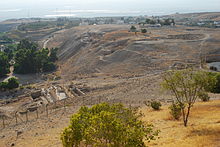
Back معركة فحل Arabic پلا دؤیوشو AZB Schlacht von Fahl German Batalla de Fahl Spanish نبرد فحل Persian Bataille de Fahl French Pertempuran Fahl ID Battaglia di Fahl Italian Битка кај Фахл Macedonian Pertempuran Fahl Malay
32°27′N 35°37′E / 32.450°N 35.617°E
| Battle of Fahl | |||||||
|---|---|---|---|---|---|---|---|
| Part of the Muslim conquest of Syria | |||||||
 The ruins of Pella | |||||||
| |||||||
| Belligerents | |||||||
| Rashidun Caliphate | Byzantine Empire | ||||||
| Commanders and leaders | |||||||
| Theodore Trithyrius (identified in Muslim sources as Saqallar ibn Mithraq) | |||||||
| Strength | |||||||
| 30,000 (estimations) | 50,000–80,000 (Arab sources) | ||||||
| Casualties and losses | |||||||
| A few hundreds to a few thousands | Heavy | ||||||
The Battle of Fahl (Arabic: يوم فحل, romanized: Yawm Faḥl), also known as the Battle of the Marshes (Yawm al-Radagha) and the Battle of Beisan (Yawm Baysān), was a major battle in the Muslim conquest of Byzantine Syria fought by the Arab troops of the Rashidun Caliphate and Byzantine forces at or near Pella (Fahl) and nearby Scythopolis (Beisan), both in the Jordan Valley, in December 634 or January 635.
Byzantine troops smarting from their rout by the Muslims at the battle of Ajnadayn had regrouped in Pella or Scythopolis and the Muslims pursued them there. The Muslim cavalry faced difficulty traversing over the muddied grounds around Beisan as the Byzantines cut irrigation ditches to flood the area and stave off the Muslim advance. The Muslims ultimately defeated the Byzantines, who are held to have suffered enormous casualties. Pella was subsequently captured, while Beisan and nearby Tiberias capitulated after short sieges by detachments of Muslim troops.